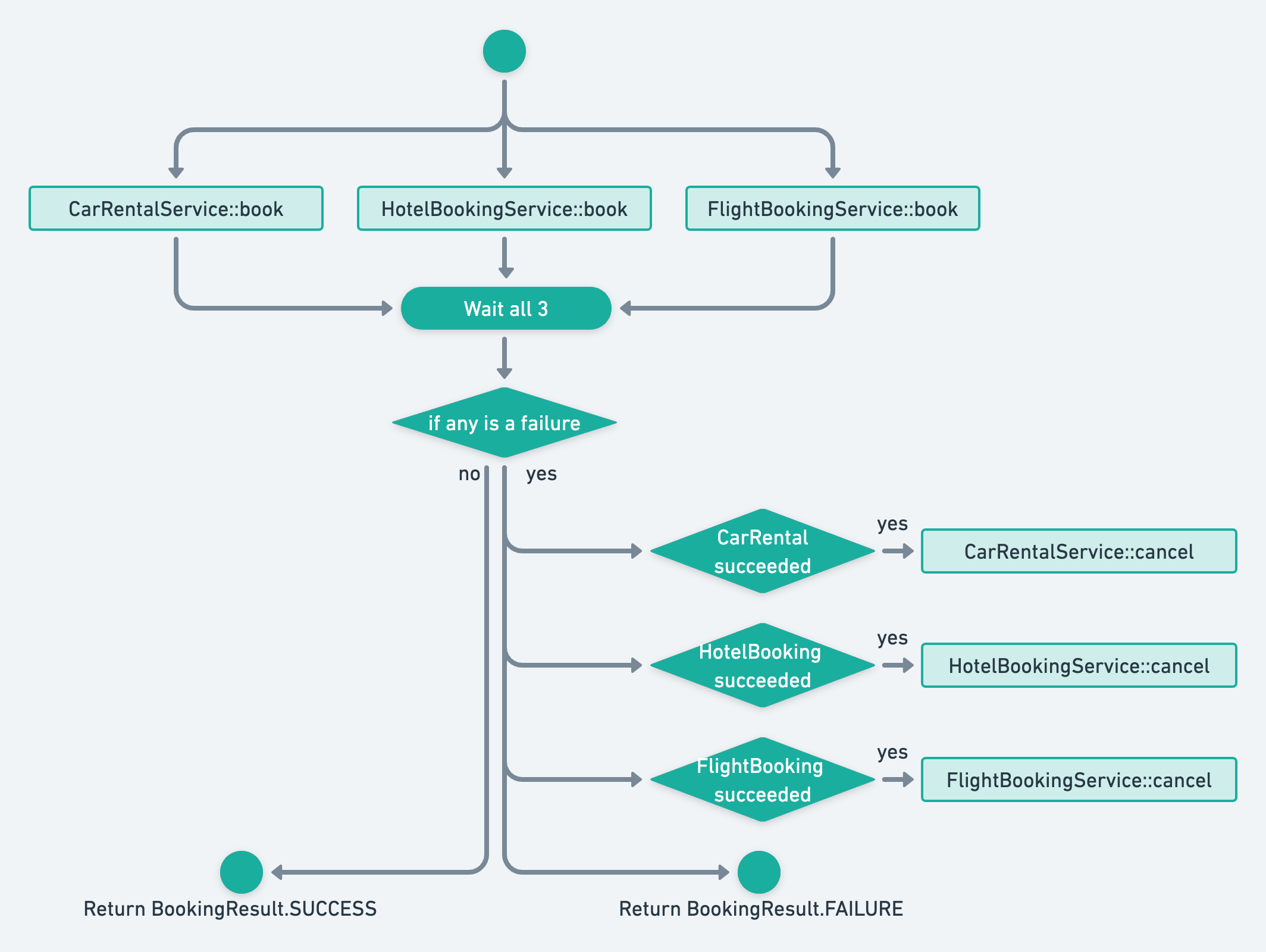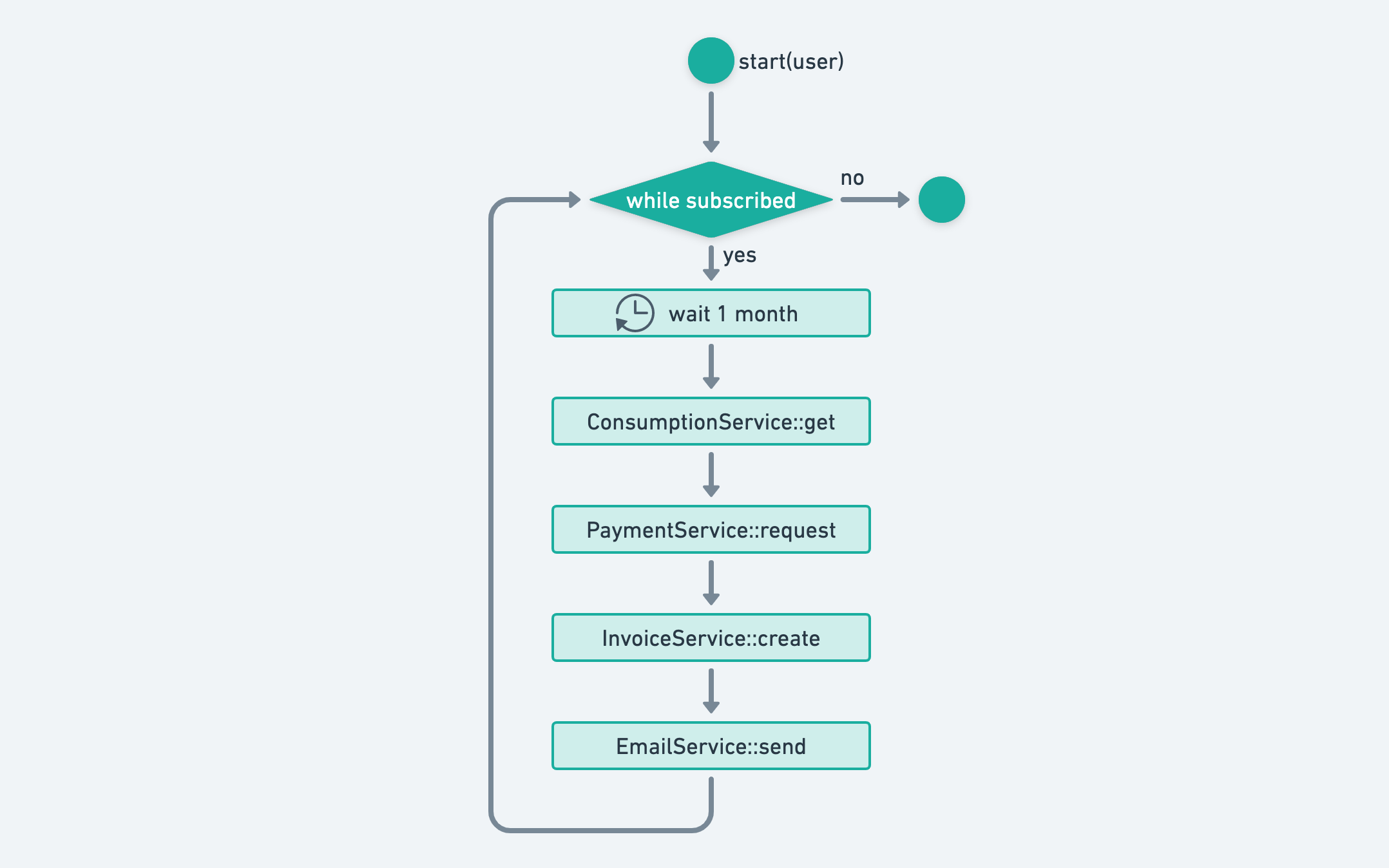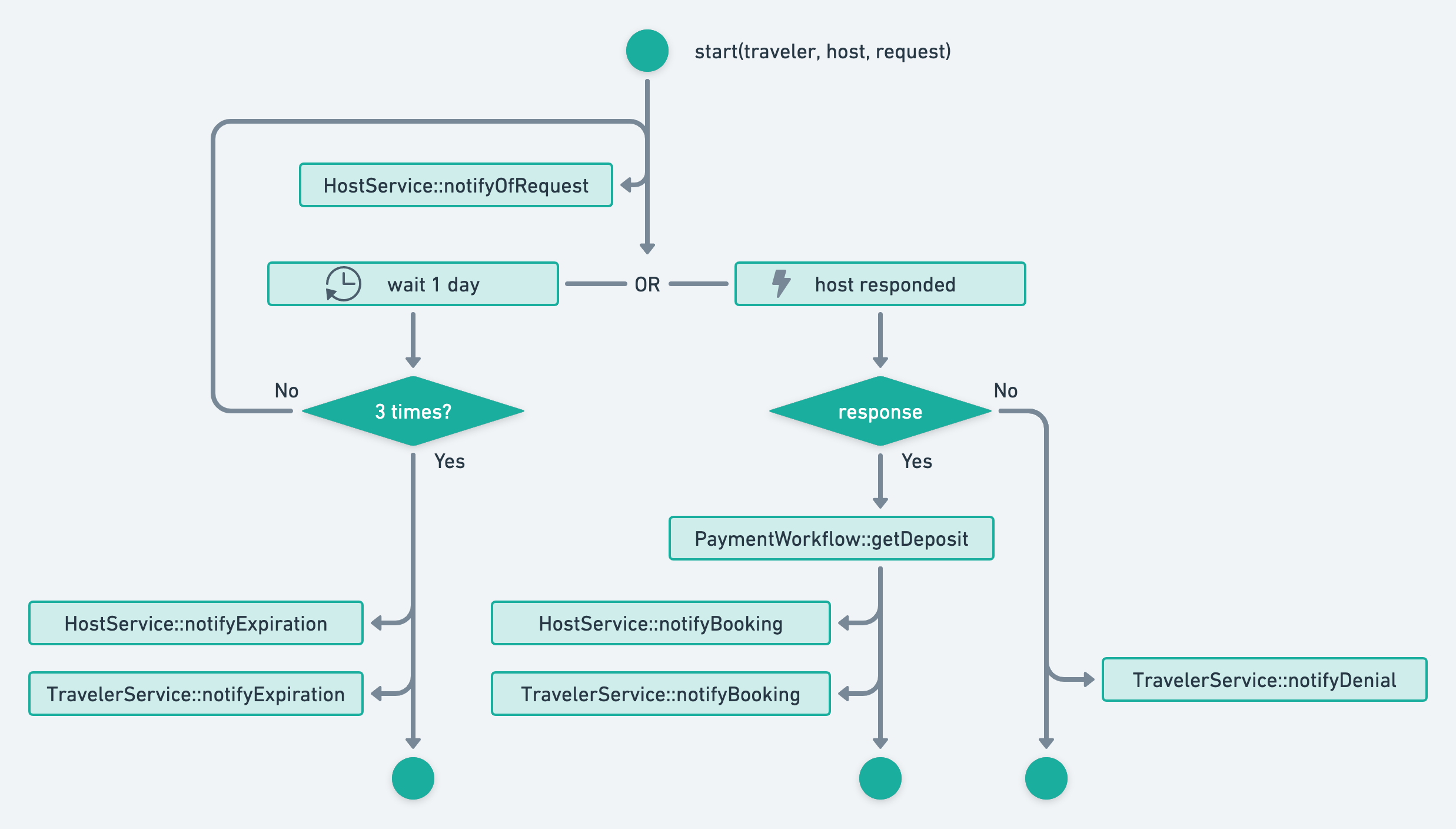Introduction
Workflow Examples
The code for those examples are available on Github.
Infinitic's power and flexibility can be best understood through examples. Here, we provide several workflow examples to showcase its capabilities.
You'll find all sources in the Infinitic's examples repository. We encourage you to explore the implementations and play with them.
Saga Workflow
Consider a booking process that includes a car rental, a flight, and a hotel reservation. All these bookings must either succeed or fail together. If any booking fails, the others that succeeded should be canceled.

Each service involved in this process, like HotelBookingService, has methods to book and cancel a booking.
import io.infinitic.annotations.Name;
@Name(name = "HotelBooking")
public interface HotelBookingService {
HotelBookingResult book(HotelBookingCart cart);
void cancel(HotelBookingCart cart);
}
import io.infinitic.annotations.Name
@Name("HotelBooking")
interface HotelBookingService {
fun book(cart: HotelBookingCart): HotelBookingResult
fun cancel(cart: HotelBookingCart)
}
The BookingWorkflow orchestrates the complete booking process:
public class BookingWorkflowImpl extends Workflow implements BookingWorkflow {
// create stub for CarRentalService
private final CarRentalService carRentalService = newService(CarRentalService.class);
// create stub for FlightBookingService
private final FlightBookingService flightBookingService = newService(FlightBookingService.class);
// create stub for HotelBookingService
private final HotelBookingService hotelBookingService = newService(HotelBookingService.class);
@Override
public BookingResult book(
CarRentalCart carRentalCart,
FlightBookingCart flightCart,
HotelBookingCart hotelCart
) {
// dispatch parallel bookings using car, flight and hotel services
Deferred<CarRentalResult> deferredCarRental =
dispatch(carRentalService::book, carRentalCart);
Deferred<FlightBookingResult> deferredFlightBooking =
dispatch(flightBookingService::book, flightCart);
Deferred<HotelBookingResult> deferredHotelBooking =
dispatch(hotelBookingService::book, hotelCart);
// wait and get result of deferred CarRentalService::book
CarRentalResult carRentalResult = deferredCarRental.await();
// wait and get result of deferred FlightService::book
FlightBookingResult flightResult = deferredFlightBooking.await();
// wait and get result of deferred HotelService::book
HotelBookingResult hotelResult = deferredHotelBooking.await();
// if all bookings are successful, we are done
if (carRentalResult == CarRentalResult.SUCCESS &&
flightResult == FlightBookingResult.SUCCESS &&
hotelResult == HotelBookingResult.SUCCESS
) {
return BookingResult.SUCCESS;
}
// else cancel all successful bookings in parallel
if (carRentalResult == CarRentalResult.SUCCESS) {
dispatch(carRentalService::cancel, carRentalCart);
}
if (flightResult == FlightBookingResult.SUCCESS) {
dispatch(flightBookingService::cancel, flightCart);
}
if (hotelResult == HotelBookingResult.SUCCESS) {
dispatch(hotelBookingService::cancel, hotelCart);
}
return BookingResult.FAILURE;
}
}
class BookingWorkflowImpl : Workflow(), BookingWorkflow {
// create stub for CarRentalService
private val carRentalService = newService(CarRentalService::class.java)
// create stub for FlightBookingService
private val flightBookingService = newService(FlightBookingService::class.java)
// create stub for HotelBookingService
private val hotelBookingService = newService(HotelBookingService::class.java)
override fun book(
carRentalCart: CarRentalCart,
flightCart: FlightBookingCart,
hotelCart: HotelBookingCart
): BookingResult {
// dispatch parallel bookings using car, flight and hotel services
val deferredCarRental = dispatch(carRentalService::book, carRentalCart)
val deferredFlightBooking = dispatch(flightBookingService::book, flightCart)
val deferredHotelBooking = dispatch(hotelBookingService::book, hotelCart)
// wait and get result of deferred CarRentalService::book
val carRentalResult = deferredCarRental.await()
// wait and get result of deferred FlightService::book
val flightResult = deferredFlightBooking.await()
// wait and get result of deferred HotelService::book
val hotelResult = deferredHotelBooking.await()
// if all bookings are successful, we are done
if (carRentalResult == CarRentalResult.SUCCESS &&
flightResult == FlightBookingResult.SUCCESS &&
hotelResult == HotelBookingResult.SUCCESS
) {
return BookingResult.SUCCESS
}
// else cancel all successful bookings in parallel
if (carRentalResult == CarRentalResult.SUCCESS) {
dispatch(carRentalService::cancel, carRentalCart)
}
if (flightResult == FlightBookingResult.SUCCESS) {
dispatch(flightBookingService::cancel, flightCart)
}
if (hotelResult == HotelBookingResult.SUCCESS) {
dispatch(hotelBookingService::cancel, hotelCart)
}
return BookingResult.FAILURE
}
}
The BookingWorkflowImpl class in Java or Kotlin performs the bookings in parallel and cancels them if any one of them fails. The code structure is as follows:
- Services for car rental, flight, and hotel are initialized.
- Bookings are dispatched in parallel.
- Results are awaited and checked.
- If any booking fails, successful ones are canceled.
The workflow is a perfect example of the Saga pattern in distributed transactions.
In a workflow, when you use the dispatch function, it starts a task without interrupting the workflow's ongoing process. If you use dispatch multiple times, it will run several tasks at the same time, in parallel. The dispatch function gives back a Deferred object. When you use the await() method on this Deferred object, it makes the workflow pause and wait until the task is finished, and then it provides the task's result.
Monthly invoicing
Imagine a workflow where, every month, we need to:
- Gather user metrics
- Charge the user's payment card
- Generate and send an invoice

With Infinitic, this process does not require a cron job. The InvoicingWorkflowImpl handles this monthly routine:
- It uses services like
ConsumptionServiceandPaymentService. - The workflow waits until the first day of the next month.
- It calculates the payment amount and processes the payment.
- An invoice is generated and sent to the user.
public class InvoicingWorkflowImpl extends Workflow implements InvoicingWorkflow {
// create stub for ComsumptionService
private final ComsumptionService comsumptionService = newService(ComsumptionService.class);
// create stub for PaymentService
private final PaymentService paymentService = newService(PaymentService.class);
// create stub for InvoiceService
private final InvoiceService invoiceService = newService(InvoiceService.class);
// create stub for EmainService
private final EmainService emainService = newService(EmainService.class);
@Override
public void start(User user) {
// while this user is subscribed
while (comsumptionService.isSubscribed(user)) {
// get current date (inlined task)
LocalDate now = inline(LocalDate::now);
// get first day of next month
LocalDate next = now.with(TemporalAdjusters.firstDayOfNextMonth());
// wait until then
timer(Duration.between(next, now)).await();
// calculate how much the user will pay
MonetaryAmount amount = comsumptionService.getMonetaryAmount(user, now, next);
// get payment for the user
paymentService.getPayment(user, amount);
// generate the invoice
Invoice invoice = invoiceService.create(user, amount, now, next);
// send the invoice
emailService.sendInvoice(user, invoice);
}
}
}
class InvoicingWorkflowImpl : Workflow(), InvoicingWorkflow {
// create stub for ComsumptionService
val comsumptionService = newService(ComsumptionService::class.java)
// create stub for PaymentService
val paymentService = newService(PaymentService::class.java)
// create stub for InvoiceService
val invoiceService = newService(InvoiceService::class.java)
// create stub for EmainService
val emainService = newService(EmainService::class.java)
override fun start(user: User) {
// while this user is subscribed
while (comsumptionService.isSubscribed(user)) {
// get current date (inlined task)
val now = inline(LocalDate::now)
// get first day of next month
val next = now.with(TemporalAdjusters.firstDayOfNextMonth())
// wait until then
timer(Duration.between(next, now)).await()
// calculate how much the user will pay
val amount = comsumptionService.getMonetaryAmount(user, now, next)
// get payment for the user
paymentService.getPayment(user, amount)
// generate the invoice
val invoice = invoiceService.create(user, amount, now, next)
// send the invoice
emailService.sendInvoice(user, invoice)
}
}
}
In a workflow, when you use a timer and await it, the workflow pauses until a specific time (Instant) or for a set period (Duration). During this wait, no resources are being used.
In a workflow, every step must be deterministic, which is why commands like LocalDate.now() should be part of a task. The inline function is used to create what's called a pseudo-task, which is integrated directly into the workflow.
A workflow should not have too many tasks, so it's best to avoid loops. In this example, the number of iterations is limited (running for 10 years results in just 120 iterations) and there are only 7 tasks in each iteration. Therefore, this setup is manageable and appropriate.
Loyalty program
Consider a loyalty program where users earn points for various actions:
- 1 point every 10 seconds
- 200 points for completing a form
- 500 points for completing an order
- Users can also burn points

LoyaltyWorkflowImpl is all we need to manages this program:
- Points are stored and updated within the workflow.
- an
addBonusmethod is used to tell the instance that the user did some actions - a
burnmethod lets the user burn some points (if enough)
public class LoyaltyWorkflowImpl extends Workflow implements LoyaltyWorkflow {
// workflow stub that targets itself
private final LoyaltyWorkflow self = getWorkflowById(LoyaltyWorkflow.class, getWorkflowId());
@Ignore
private final long secondsForPointReward = 10;
private long points = 0;
@Override
public long getPoints() {
return points;
}
@Override
public void start() {
// every `secondsForPointReward` seconds, a new point is added
timer(Duration.ofSeconds(secondsForPointReward)).await();
points++;
// Loop
dispatchVoid(self::start);
}
@Override
public void addBonus(BonusEvent event) {
switch (event) {
case FORM_COMPLETED:
points+= 200;
break;
case ORDER_COMPLETED:
points+= 500;
break;
}
}
@Override
public PointStatus burn(long amount) {
if (points - amount >= 0) {
points -= amount;
return PointStatus.OK;
} else {
return PointStatus.INSUFFICIENT;
}
}
}
class LoyaltyWorkflowImpl : Workflow(), LoyaltyWorkflow {
// workflow stub that targets itself
private val self = getWorkflowById(LoyaltyWorkflow::class.java, workflowId)
@Ignore
private val secondsForPointReward: Long = 10
private var points: Long = 0
override fun getPoints() = points
override fun start() {
// every `secondsForPointReward` seconds, a new point is added
timer(Duration.ofSeconds(secondsForPointReward)).await()
points++
// Loop
dispatch(self::start)
}
override fun addBonus(event: BonusEvent) {
points += when (event) {
BonusEvent.FORM_COMPLETED -> 200
BonusEvent.ORDER_COMPLETED -> 500
}
}
override fun burn(amount: Long) =
if (points - amount >= 0) {
points -= amount
PointStatus.OK
} else {
PointStatus.INSUFFICIENT
}
}
An Infinitic client, or another workflow, can invoke methods of an active workflow. While it's possible for multiple methods of the same workflow instance to operate concurrently, only one method runs at any specific moment. You can think of this as an asynchronous, yet single-threaded execution.
Properties within workflows serve as a way to store information that can be modified by various methods.
A workflow shouldn't have too many tasks, which is why we restart the start method instead of looping within it.
Location Booking
Imagine an Airbnb-like service where travelers request bookings from hosts.
- Travelers' requests are sent to hosts.
- If the host responds positively, the traveler pays a deposit.
- Both parties are then notified of the booking.

LocationBookingWorkflowImpl handles this process:
public class LoyaltyWorkflowImpl extends Workflow implements LoyaltyWorkflow {
@Ignore
private final long DAY_IN_SECONDS = 24L * 3600;
// create channel for BookingRequestStatus
private final Channel<BookingRequestStatus> responseChannel = channel();
// create stub for HostService
private final NotificationService notificationService = newService(NotificationService.class);
// create stub for PaymentWorkflow
private final PaymentWorkflow paymentWorkflow = newWorkflow(PaymentWorkflow.class);
@Override
public Channel<BookingRequestStatus> getResponseChannel() {
return responseChannel;
}
@Override
public void start(BookingRequest request) {
// start accepting one signal in the channel
Deferred<BookingRequestStatus> deferredResponse = responseChannel.receive(1);
for (int attempt = 1; attempt <= 3; attempt++) {
// notify host of traveler request
dispatchVoid(notificationService::notifyHostOfRequest, request, attempt);
// start a timer for a day
Deferred<Instant> timer = timer(Duration.ofSeconds(DAY_IN_SECONDS));
// Checks the completion of one of them
or(timer, deferredResponse).await();
// exit loop if we received a response from the host
if (deferredResponse.isCompleted()) break;
}
// we did not receive host's response
if (!deferredResponse.isCompleted()) {
// notify host of request expiration
dispatchVoid(notificationService::notifyHostOfRequestExpiration, request);
// notify traveler of request expiration
dispatchVoid(notificationService::notifyTravelerOfRequestExpiration, request);
// workflow stops here
return;
}
BookingRequestStatus response = deferredResponse.await();
switch (response) {
case ACCEPTED:
bookingAccepted(request);
break;
case DENIED:
bookingDenied(request);
break;
}
}
private void bookingAccepted(BookingRequest request) {
// trigger deposit workflow and wait for it
paymentWorkflow.getDeposit(request);
// notify host of the successful payment
dispatchVoid(notificationService::notifyHostOfPaymentSuccess, request);
// notify traveler of the successful booking
dispatchVoid(notificationService::notifyTravelerOfBookingSuccess, request);
}
private void bookingDenied(BookingRequest request) {
// notify traveler of host denial
dispatchVoid(notificationService::notifyTravelerOfBookingDenial, request);
}
}
public class LoyaltyWorkflowImpl: Workflow(), LoyaltyWorkflow {
@Ignore
private val DAY_IN_SECONDS = 24L * 3600
// create stub for HostService
private val notificationService = newService(NotificationService::class.java)
// create stub for PaymentWorkflow
private val paymentWorkflow: PaymentWorkflow = newWorkflow(PaymentWorkflow::class.java)
// create channel for BookingRequestStatus
private val responseChannel = channel<BookingRequestStatus>()
override fun getResponseChannel() = responseChannel
override fun start(request: BookingRequest) {
// start accepting one signal in the channel
val deferredResponse = responseChannel.receive(1)
repeat(3) { attempt ->
// notify host of traveler request
dispatch(notificationService::notifyHostOfRequest, request, attempt + 1)
// start a timer for a day
val timer = timer(Duration.ofSeconds(DAY_IN_SECONDS))
// wait for the timer or the signal
(timer or deferredResponse).await()
// exit loop if we received a response from the host
if (deferredResponse.isCompleted()) return@repeat
}
// we did not receive host's response
if (!deferredResponse.isCompleted()) {
// notify host of request expiration
dispatch(notificationService::notifyHostOfRequestExpiration, request)
// notify traveler of request expiration
dispatch(notificationService::notifyTravelerOfRequestExpiration, request)
// workflow stops here
return
}
when(deferredResponse.await()) {
BookingRequestStatus.ACCEPTED -> bookingAccepted(request)
BookingRequestStatus.DENIED -> bookingDenied(request)
}
}
private fun bookingAccepted(request: BookingRequest) {
// trigger deposit workflow and wait for it
paymentWorkflow.getDeposit(request)
// notify host of the successful payment
dispatch(notificationService::notifyHostOfPaymentSuccess, request)
// notify traveler of the successful booking
dispatch(notificationService::notifyTravelerOfBookingSuccess, request)
}
private fun bookingDenied(request: BookingRequest) {
// notify traveler of host denial
dispatch(notificationService::notifyTravelerOfBookingDenial, request)
}
}
This workflow showcases complex decision-making and communication between multiple parties.
We have the ability to dispatch external signals to a workflow to inform it of an event or change. A signal is a type of serializable object. For a workflow to receive and process a signal, it needs to be equipped with a channel.
This example with the `PaymentWorkflow`` demonstrates that a workflow can launch another sub-workflow, either in a synchronous or asynchronous manner. This capability unlocks endless possibilities.
